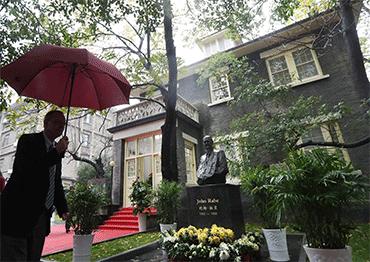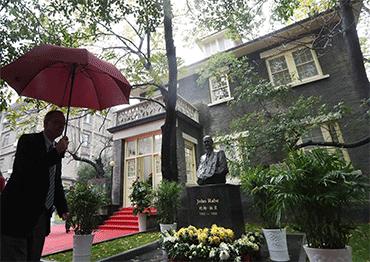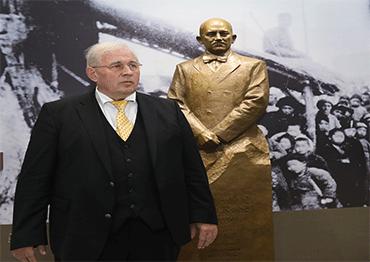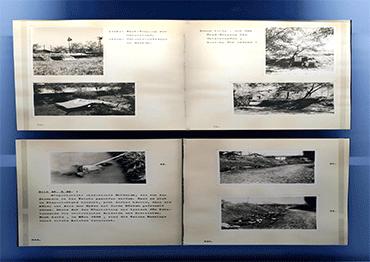his year marks the 80th anniversary of victory in the Chinese People’s War of Resistance Against Japanese Aggression and the World Anti-Fascist War. This summer, a movie about the Nanjing Massacre in December 1937, in which more than 300,000 Chinese civilians and disarmed soldiers were killed, became a box office hit. Dead to Rights, which earned more than 1 billion yuan (US$149m) in its first week after premiering on August 1, is a historical drama based on documented atrocities, including mass murder, rape and looting during the Nanjing Massacre. The movie depicts a group of people who seek refuge in a photographic studio, helping to rescue people while developing photos to document the atrocities committed by Japanese invaders. In the real history, Luo Jin, an apprentice at a photographic studio in Nanjing, developed the photos, and Wu Xuan kept the photos and submitted them to the Nanjing Military Tribunal for war crimes in 1946. Luo and Wu died in 1998 and 2005.
During this horror, 250,000 Chinese civilians and disarmed soldiers were protected inside a safety zone established by a group of Westerners that chose to stay in Nanjing, capital of China at that time. Following the example of the safety zone set up by French missionary Robert Jacquinot de Besange (known as Rao Jiaju in China) in November 1937 that sheltered 300,000 civilians during the Japanese attack on Shanghai, the International Committee for the Nanking Safety Zone was established later that month. Led by German businessman John Rabe (1882-1950), who was in charge of Siemens China, the committee operated 25 refugee camps distributed among government office buildings, hostels, colleges and primary schools. Covering 3.86 square kilometers in downtown Nanjing, the safety zone provided security, food and medical care.
Members of the committee had to constantly confront Japanese soldiers to protect the refugees. Rabe, in particular, had to negotiate with and challenge the Japanese.
Committee members were determined to record and expose the Japanese atrocities. American Episcopal priest John Gillespie Magee (1884- 1953), chairman of the Nanjing Branch of the International Red Cross and a member of the Safety Zone Committee, risked his life to capture the only film of the Nanjing Massacre. It was secretly transported to Shanghai in 1938 by US Protestant missionary George Ashmore Fitch (1883-1979), also a committee member, who had the reel sewn into his coat lining. It was presented as evidence to the International Military Tribunal for the Far East, which took place in Tokyo in 1946 to prosecute Japan’s military leaders for war crimes. The film, as part of the Documents of the Nanjing Massacre, was listed in the Memory of the World Register by UNESCO in 2015.
John Rabe, remembered as the Oskar Schindler of China, or as the Good German of Nanking, wrote diaries from September 1937 to February 1938. On December 24, 1937 he wrote: “I wanted to see these atrocities with my own eyes, so that I can speak as an eyewitness later,” according to the john-rabe.de website. Rabe’s own residence in the University of Nanjing and the German school in the safety zone hosted 600 refugees. He wrote on December 26, 1937 that the 600 lives saved were the Christmas gift he “couldn’t have wished for any better,” his grandson Thomas Rabe told China News Service.
It was not until the end of 1996 that his diaries were released by his granddaughter Ursula Reinhardt in New York, largely thanks to efforts of Iris Chang (1968-2004), author of The Rape of Nanking (1997). The German edition of the diaries, published in 1997, was edited by Erwin Wickert, who was a German ambassador to China in the 1970s. The Chinese translation was published the same year, and the English version, The Good Man of Nanking: The Diaries of John Rabe, was published in the US in 1998 and in the UK in 1999.
In 2016, the Rabe family donated Rabe’s original eight diaries titled Enemy Planes over Nanjing to China’s Central Archives. In 2017, the photocopied unabridged version of The Diaries of John Rabe, more than 2,000 pages, was donated by John Thomas Rabe to the State Archives Administration of China. “Only people who experienced this part of history can really understand it. Only by giving these historical records to China can this part of history be better understood,” he told China’s State broadcaster China Central Television.
For years Thomas Rabe has been carrying and promoting his grandfather’s humanitarian legacy. His book, Rabe and China, was published in January 2024 in China, which tells of John Rabe’s 30-year experience in different cities, including Beijing, Tianjin and Nanjing. The 74-year-old professor emeritus of gynecology and obstetrics at Heidelberg University Hospital has shared his expertise as a visiting professor at Beijing Obstetrics and Gynecology Hospital, Capital Medical University since 2014.
The Rabe family’s contributions have always been recognized and remembered by China. After John Rabe returned to Germany in 1938, he was interrogated by the Gestapo and forced to keep silent about what happened in Nanjing. He and his family lived in poverty. He received care packages of food and financial donation from the Chinese government and people.
To commemorate the 70th anniversary of victory in the Chinese People’s War of Resistance against Japanese Aggression, in September 2015 China awarded medals to 30 Chinese and foreign civilians and veterans who fought for China during WWII. Thomas Rabe received the medal on behalf of his grandfather.
Thomas Rabe was honored with the Chinese Government Friendship Award in 2018, and the Friendship Envoy Award at the 2025 Orchid Awards in July. Thomas Rabe and his wife have established six John Rabe Communication Centers in Germany, China, Spain and Romania, to preserve documents about John Rabe’s life and promote international understanding.
In an interview with China News Service, Thomas Rabe stressed that “The Rabe Diaries and Rabe and China act as counterpoints to the Eurocentric WWII narrative,” and he shared how his grandfather’s courage has inspired him that even small actions by individuals, with compassion and courage, can make a big difference in dark times.
China News Service: How did you learn about the history of your grandfather John Rabe?
Thomas Rabe: My grandfather passed away on January 5, 1950, in Berlin as a result of a stroke. I was born on February 18, 1951, in Heidelberg and therefore never got to know my grandfather personally. My father [Otto Rabe] often spoke about him, as did my godmother, Mrs Ursula Reinhardt. From these accounts, I was able to form a picture of who my grandfather was.
It wasn’t until the end of my university studies that I was able to engage with my grandfather’s books. As children, we only heard charming anecdotes about life in China from my father and my godmother.
During his lifetime, my father had received the diaries from his father – our grandfather – along with the obligation to continue them and make them accessible to the public. He also passed these diaries and other historical documents on to me during his lifetime, with the promise that I would continue my grandfather’s legacy and make his historical records available to the public.
CNS: Over the years, you have been committed to spreading John Rabe’s spirit of humanitarianism. Can you share one or two stories that impressed you most during these cultural exchanges?
TR: Promoting the multilingual publication of Rabe and China has been more than just a literary project, it has been a mission to preserve memory, encourage dialogue and build understanding across cultures. Telling John Rabe’s story to people from different countries has opened the door to countless meaningful exchanges, some of which left a lasting impression on me.
One moment that stands out occurred during a cultural event in Germany. After a reading session, an elderly woman came forward, visibly emotional. She shared that while she had heard of John Rabe in passing, she never fully grasped the extent of his bravery until she read his story in her own language. Through tears, she expressed how proud she was to learn that a German like Rabe had stood up for humanity during one of the darkest chapters of the 20th century. Her words were a powerful reminder that personal stories when told with honesty can awaken empathy and pride in an unexpected way.
Another unforgettable experience took place at a high school in Japan. After presenting Rabe’s story, a student asked a simple but profound question: “How can we be like him today?” That question sparked a heartfelt discussion among the students and teachers about moral courage, personal responsibility and the importance of standing up for others. In that moment, I saw how the story of a man from the past could still challenge and inspire the young people of today, regardless of national borders.
These stories show that John Rabe’s legacy is not frozen in history, it is alive and resonating with new generations around the world. By continuing to share his story in many languages and cultures, we are not only preserving history, we are planting seeds of empathy, courage and hope.
CNS: Which of his statements and words left a lasting impression on you?
TR: “September 21, 1937 Can I – and am I allowed to – run away under these circumstances? I don’t think so! Anyone who has ever sat in a shelter for hours during an air raid, holding a trembling Chinese child in each hand, will be able to understand how I feel.”
He couldn’t bear to abandon his poor employees, who had no money to flee to Hankou [part of Wuhan that acted as capital of China for a brief time after the fall of Nanjing], leaving them behind on their own. He wrote the following in his diary: October 17 (from a letter) Now you’d probably like to know why we are still here and how we are currently living. Well, let’s be honest: One wants to remain a decent fellow and not simply abandon one’s subordinate employees and domestic staff with their families in times like these, but rather stand by them with advice and practical help. That should go without saying!”
“We are soldiers of labor, we are a government of workers, we are friends of the workers, we do not abandon the worker, the poor, in their time of need.”
CNS: The bond between your family and China has lasted for 117 years across four generations. What do you suggest to promote people-to-people exchanges between Germany and China?
TR: Friendly exchanges between China and Germany can be strengthened on various levels – culturally, economically, politically and through civil society. Here are some concrete suggestions for improving bilateral relations:
First, intensify cultural exchange. More cultural events: Festivals, art exhibitions, film weeks and concerts in both countries that showcase each other's culture. Language promotion: Expansion of language courses (Chinese in Germany, German in China) and more exchange programs for language teachers. City partnership: Strengthen and actively maintain sister city partnerships (Berlin-Beijing,Hamburg-Shanghai) with regular citizen exchanges.
Second, education and science. Student exchange: More exchange programs, scholarships and joint degree programs. Scientific cooperation: Joint research projects, especially in globally relevant fields such as climate, medicine or AI. German-Chinese schools and university partnerships: Support existing educational institutions with binational character (Chinese-German universities).
Third, economy and innovation. Promote business cooperation: Joint ventures and sustainable investment projects with knowledge transfer.
Start-up programs: Support for entrepreneurship and incubators with a German-Chinese focus. Skilled labor exchange: Simplify visa and employment regulations for interns and professionals.
Fourth, civil society and dialogue. Citizen dialogues and NGOs: Build exchange platforms for civil society organizations, think tanks and social projects. Media exchange: Joint media projects to improve mutual understanding and reduce prejudice.
Digital dialogue: Use digital platforms for online seminars, discussion forums and intercultural workshops.
Fifth, political and diplomatic exchange. City diplomacy: Mayor visits and local delegation trips. Programs for young diplomats and parliamentarians: Exchange programs for young politicians and civil servants. Strengthen multilateral cooperation: Work together in international organizations such as the UN or G20, with a focus on shared interests.
Sixth, building trust through transparency. Open discussion of differences: Engage in objective dialogue on disagreements (human rights, freedom of the press) without breaking off contact. Long-term partnerships instead of short-term interests: Focus on mutual respect, sustainable relationships and win-win cooperation.

 Old Version
Old Version


